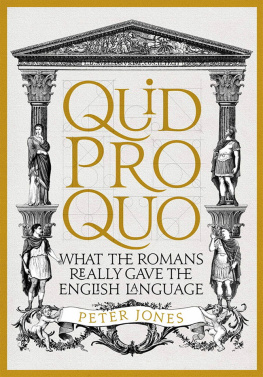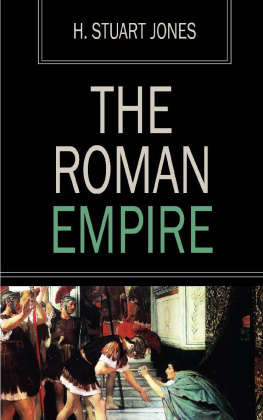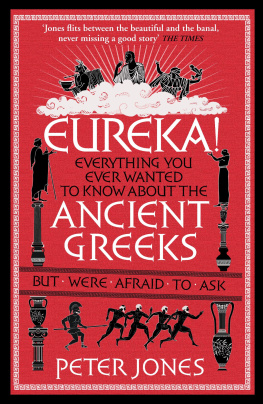Jones - Quid pro quo: what the Roman really gave the English language
Here you can read online Jones - Quid pro quo: what the Roman really gave the English language full text of the book (entire story) in english for free. Download pdf and epub, get meaning, cover and reviews about this ebook. City: London, year: 2016, publisher: Atlantic Books, genre: Religion. Description of the work, (preface) as well as reviews are available. Best literature library LitArk.com created for fans of good reading and offers a wide selection of genres:
Romance novel
Science fiction
Adventure
Detective
Science
History
Home and family
Prose
Art
Politics
Computer
Non-fiction
Religion
Business
Children
Humor
Choose a favorite category and find really read worthwhile books. Enjoy immersion in the world of imagination, feel the emotions of the characters or learn something new for yourself, make an fascinating discovery.
Quid pro quo: what the Roman really gave the English language: summary, description and annotation
We offer to read an annotation, description, summary or preface (depends on what the author of the book "Quid pro quo: what the Roman really gave the English language" wrote himself). If you haven't found the necessary information about the book — write in the comments, we will try to find it.
Jones: author's other books
Who wrote Quid pro quo: what the Roman really gave the English language? Find out the surname, the name of the author of the book and a list of all author's works by series.
Quid pro quo: what the Roman really gave the English language — read online for free the complete book (whole text) full work
Below is the text of the book, divided by pages. System saving the place of the last page read, allows you to conveniently read the book "Quid pro quo: what the Roman really gave the English language" online for free, without having to search again every time where you left off. Put a bookmark, and you can go to the page where you finished reading at any time.
Font size:
Interval:
Bookmark:


Also by Peter Jones
Vote for Caesar
Learn Latin: The Book of the
Daily Telegraph QED Series
Veni, Vidi, Vici
Eureka!

First published in hardback in Great Britain in 2016 by Atlantic Books,
an imprint of Atlantic Books Ltd.
Copyright Peter Jones 2016
The moral right of Peter Jones to be identified as the author of this work has been asserted
by him in accordance with the Copyright, Designs and Patents Act of 1988.
All rights reserved. No part of this publication may be reproduced, stored in a retrieval system, or transmitted in any form or by any means, electronic, mechanical, photocopying, recording, or otherwise, without the prior permission of both the copyright owner and the above publisher of this book.
1 2 3 4 5 6 7 8 9
A CIP catalogue record for this book is available from the British Library.
Hardback ISBN: 978-1-78239-931-5
E-book ISBN: 978-1-78239-932-2
Paperback ISBN: 978-1-78239-933-9
Printed in Great Britain
Atlantic Books
An Imprint of Atlantic Books Ltd
Ormond House
2627 Boswell Street
London
WC1N 3JZ
www.atlantic-books.co.uk

CONTENTS

PREFACE
T ake the word adrenalin. This hormone, one of the most important in the body, is found in a gland located on top of the kidneys. The Latin stem renal- meant to do with the kidneys and ad meant near. Hence adrenalin. But no Roman would have recognized the word. It was invented, using Latin stems, in 1901.
Take microbe. This derives from two ancient Greek words, mikros (small, short) and bios (life). No Greek would have recognized it. It was invented, using Greek stems, in 1881. And a very incompetent invention it was too, microbes being millions of years old.
English is full of such predominantly technical words, invented over the past 400 years. They were designed, in particular, to provide the specialized vocabulary required for the then developing disciplines of science and medicine, and the naming of flora and fauna. Indeed, if all of them were taken into account, you could say that English was 90 per cent Graeco-Latin!
Many such invented words will feature in and ancient Greek words used by the Greeks and Romans themselves, whether in the same sense as we use them or not words such as plasma, electron, fornicate, prune, cement, agony and poet. In this respect my debt to the magnificent Oxford Latin Dictionary, edited by Peter Glare and his team, is very great indeed.
But it is not simply a book of words or lists of words, though there are a few summarizing lists here and there. The words have also been selected in order to give the reader some sense of the culture and history of the ancient Roman world, and of Romes connection with the ancient Greek world too. For the Romans took over and latinized many ancient Greek words, just as we have taken over and anglicized many Greek and Roman ones.
So the book has another great pleasure to offer: an easy introduction to the ancient Greek alphabet, the source of the Latin alphabet and ours too. As you will find, nearly half the Greek alphabet is almost identical with English.
It will work as follows: where a Latin word which we use derives directly from Greek, the Latin word will be quoted, its Greek original given in English letters, and then in Greek letters (transliterated, in other words). For example, our stomach derives, via Latin stomachus, from Greek stomakhos (). A full Greek alphabet a crisply economical twenty-four letters, as opposed to Englishs absurdly bloated twenty-six is provided on p. 23. It should prove a pleasantly harmless way to become acquainted with this enormously influential alphabet that in the eighth century BC first introduced to the West the independent representation of vowel sounds alongside consonants.
My grateful thanks are due to Alan Beale for much general linguistic help, and to Professors Philip van der Eijk and Kenneth Saunders for consultations on medical matters.
Peter Jones
www.classicsforall.org.uk

THE LATIN
LANGUAGE
HISTORICAL SURVEY:
500 BCAD 1700
T he Latin language is so called because it was spoken in a region of Italy called Latium, by people calling themselves Latini. It was only one of a number of Italic languages being used across Italy. One of these Latin-speaking towns was Roma, populated by Romani.
We know of twenty-two languages in all across Italy from this early period, and scholars speculate from other less secure evidence (such as strange-looking proper names) that there may have been as many as about forty. But from about 500280 BC, by conquest and alliance, Romans came to control most of Italy, taking Latin with them wherever they went. By the first century BC, virtually all of Italy was speaking Latin. Indeed, by the first century AD, Latin was referred to as sermo Italus, the Italian language. Latin sermo, speech, language, conversation, gossip, giving us sermon, seems to have been connected with a root meaning link up, join.
A common form of ancient Greek had also become standard across much of the Mediterranean by this time (though not for poetry). That is why the New Testament was written in that language (and the gospels are probably accurate in saying that Jesus could speak Greek when he needed to, though Aramaic was his first language). Since Greek language and culture exerted a lasting influence over the Romans, the children of elite families also learned the literary, classical Greek of the eighth to fourth centuries BC as part of their education.
By the first century AD, the Romans were also the dominant people of an empire stretching from Britain to Syria and from the RhineDanube to North Africa, and Latin became embedded in areas of Western Europe such as Gaul and Spain, which Rome held. Over hundreds of years, Latin in these areas gradually morphed into todays so-called romance languages (French, Spanish, etc.).
Classical Latin is the Latin of high literature Catullus, Cicero, Virgil, Tacitus, for example composed in the first centuries BC and AD. This elite Latin in its written form changed remarkably little. Even in the Middle Ages, the educated still tried consciously to copy it. By about AD 1000, it had become an artificial language, but it was still learned at school for certain purposes, following fixed rules. So it remains today. Anyone who knows classical Latin will not find much difficulty in translating the Latin of the church, the Middle Ages, the Renaissance or later.
But Vulgar Latin the sort used by the man on the forum omnibus was far more malleable (vulgus, crowd, mob, common people, though even Cicero said that he spoke very differently from the way he wrote). It survives mainly in graffiti scribbled on the walls of Pompeii and other cities. This spoken
Font size:
Interval:
Bookmark:
Similar books «Quid pro quo: what the Roman really gave the English language»
Look at similar books to Quid pro quo: what the Roman really gave the English language. We have selected literature similar in name and meaning in the hope of providing readers with more options to find new, interesting, not yet read works.
Discussion, reviews of the book Quid pro quo: what the Roman really gave the English language and just readers' own opinions. Leave your comments, write what you think about the work, its meaning or the main characters. Specify what exactly you liked and what you didn't like, and why you think so.















